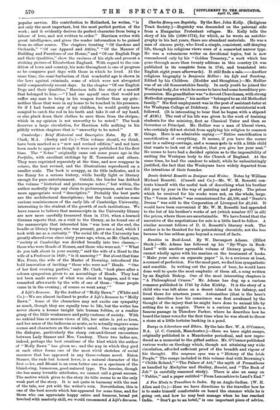Cambridge : Brief Historical and Descriptive Notes. By J. W.
Clark, M.A. (Seeley and Co.)—This volume should, we think, have been marked as a "new and revised edition," and not have been made to appear as though it were now published for the first time. The " Notes " originally came out some years ago in the Portfolio, with excellent etchings by H. Toussaint and others. They were reprinted separately at the time, and now reappear in octavo, the text revised, and the illustrations reproduced on a smaller scale. The book is scrappy, as its title indicates, and is too flimsy for a serious history, while hardly light or literary enough for pure entertainment. Outside, the binder has dubbed the volume "historical and picturesque notes ;" but within, the author modestly drops any claim to picturesqueness, and uses the more appropriate word "descriptive." Probably the best parts are the architectural descriptions; but the book contains some curious reminiscences of the early life of Cambridge University, interesting to the student of the growth of such institutions. We have reason to believe that manuscripts in the University library are now more carefully treasured than in 1710, when a learned German reports that, on a visit to the library, as he found one of the manuscripts that interested him "was torn at the end, the beadle or library keeper, who was present, gave me a leaf, which I took with me as a curiosity." The social life of the University has greatly altered even since sixty years ago, when, as Mr. Clark says, "society at Cambridge was divided broadly into two classes,— those who were Heads of Houses, and those who were not." "What do you talk about in your society," said the wife of a Head to the wife of a Professor in 1829; "is it amusing ? " But about that time Mrs. Frere, the wife of the Master of Downing, introduced the bold innovation of inviting "those who were not" Heads. "One of her first evening parties," says Mr. Clark, "took place after a solemn symposium given to an assemblage of Heads. They had not been made aware of what was about to happen, and it was remarked afterwards by the wife of one of them : Some people came in in the evening; of course we went away."


















































 Previous page
Previous page